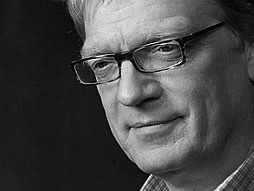The Great Sir Ken !
He is just one of those people. One of those who tell us that it is OK to be human, which we tend to forget. More than OK, our human qualities should shape the running of the world to a much larger extent than is the case today, if Sir Ken Robinson had his word to say. Especially when it comes to his particular concern, education.
I first saw Ken Robinson a couple of years ago at a conference in New York. Apart from alluring the audience with his very British wit, Robinson succeeded in pressing more than one tear out of the eyes of the hard-boiled media executives there, telling the story of young drop-outs finding their way back to life through the arts. I think we all came out of there wondering why on earth the entire school system looked like it did – the need for revolution as designed by Robinson seemed such an evidence!
The man does not look like the usual revolutionary, though. Although a Californian by adoption, Robinson oozes European academia with that very clear logic of things that only the Brits master with quite such ease. And he spent years counselling school politics from the inside, to government bodies and universities, before becoming a celebrated author and think-tank. He is professor emeritus of the University of Warwick and has received a number of honorary degrees. In 2003, Queen Elizabeth II made him Knights Bachelor for his services to the arts.
A celebrated revolutionary co-opted by the establishment, thus. It seems like a comfortable situation to be in. Or is it?
The originality of Robinson is his engagement for personal fulfilment, believing this is essential for the health of our communities. For him, there are three principles on which human life flourishes: human beings are naturally different and diverse, curiosity is essential for learning and human life is inherently creative. These principles, he says, are contradicted by today’s culture of education, with its narrow spectrum of achievement and search for conformity. He advocates the abandon of the “mechanised” conceptions of education for the profit of a more personalised, flexible model where conditions for letting individual talent to flourish are created. With the future being uncertain, we need a model that champions diversity, not conformity. “Recognising talent and capacity are at the heart of social change”, he says, “and it’s not about standardisation but about raising the standards!” He endorses an education with a broad spectrum of subjects (including arts, humanities and physical education), restoring the status of the teachers (“it is a creative job”), less obsessive testing and individual support when needed. “Raising the status and support of teachers is an investment: in some places like Australia, Canada, South Korea and Hong Kong, the policy makers have understood this”. What we need is to create is “a climate of possibility”. But to get away from the present educational system, “built on a fast-food model and impoverishing our spirits and our energies”, nothing less than a revolution is needed. Robinson urges us to get involved in that movement, be it on a national or a very local level.
We love Robinson because his ideas, related through his lectures and books, are at the same time so bold and so obviously compelling. Still, on a governmental level, very few of his ideas seem to be implemented – knighted or not. The gap between what we intuitively know to be the right strategy on the long term and the – real or imagined – demands of the harsh reality of contemporary life seems insuperable. And this despite the cold economic benefits that Robinson can present to support his ideas.
Robinson’s ideas question not only the educational system but the complete western vision of learning in general, rejecting the linear idea of life, introducing an organic view of personal potential. This does not fit with present governmental policies, striving as they are toward the perfect systematization of things. It is fascinating to see how our times, so rich in humanities and information and talk of individuality, are still ruled by the idea that the right system will solve the major part of society’s issues. Nobody will contest that systems are needed. But what we need to acknowledge is the value of the things that make us different from one another and make us step outside the very same system. It is our individuality that can add the unique value. That value is not only essential to our production and economy, to see matters in the crass real-political daylight, but also to the simple well being of people.
In order to develop our potential, we need to consider the human and let the children – and the less young – explore and develop their individual talents. Only a community that accepts the individual can develop and strive on the long term. It might be less easy to manage, it might not. But it certainly is a richer and more dynamic one – and it is more than likely one of the keys towards restoring confidence in our future, something we westerners desperately need. “Organisms are not mechanisms”, Robinson says, “we flourish under certain conditions, we fade under certain conditions. Therefore, the big problem is the de-personification of learning, thinking it can be standardised”. And he cites Michelangelo:
“The problem is not to aim too high and fail, but to aim too low and succeed.”
Thank you, Sir Ken.
To read:
- “Out of our minds: learning to be creative”
- “The Element: how finding your passion changes everything”
You can also find several videos of Sir Ken’s presentations on the net, not to miss.

























